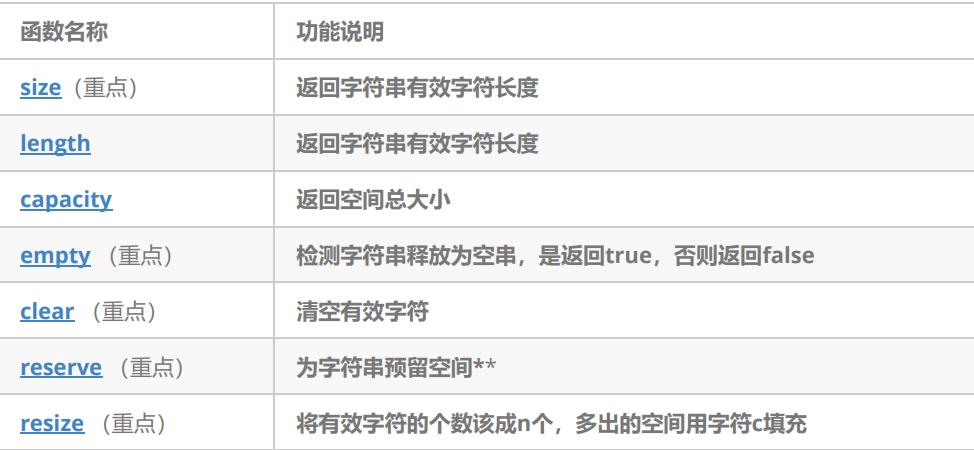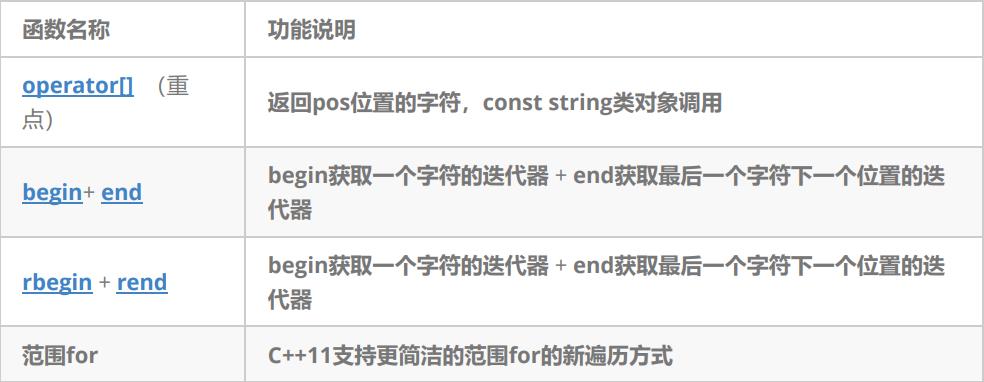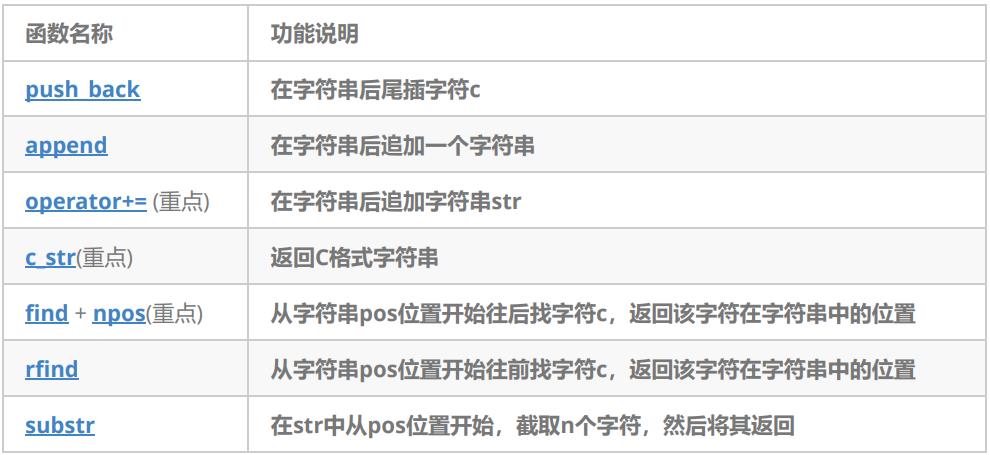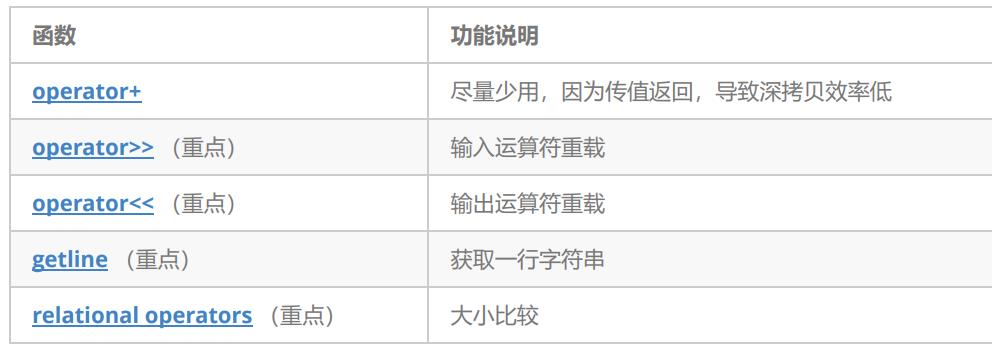C++ string类
Posted -A7
tags:
篇首语:本文由小常识网(cha138.com)小编为大家整理,主要介绍了C++ string类相关的知识,希望对你有一定的参考价值。
C++string类
一.为什么要学string类
1.C语言中的字符串
C语言中,字符串是以\\0结尾的一些字符集合,为了操作方便,C标准库中提供了一些str系列的库函数,但是这些库函数与字符串是分开的,不太适合OOP的思想,而且底层空间需要用户自己管理,稍不留神可能还会越界访问。
二.标准库中的string类
1.string类
1.string是表示字符串的字符串类。
2.该类的接口与常规容器接口基本相同,在添加了一些专门用来操作string的常规操作。
3.string在底层实际是:basic_string模板类的别名,typedef basic_string<char, char_traits, allocator> string;
4.不能操作长字节或者长字符的序列。
在使用string类时,必须包含
#include头文件以及using namespace std;
2.string类的常用接口说明
- string类对象的常见构造

2.string类对象的容量操作

注意:
1.size()与length()方法底层实现原理完全相同,引入size()的原因是为了与其他容器的接口保持一致,一般情况下基本都是用size()。 - clear()只是将string中有效字符清空,不改变底层空间大小。
- resize(size_t n) 与 resize(size_t n, char c)都是将字符串中有效字符个数改变到n个,不同的是当字符个数增多时:resize(n)用0来填充多出的元素空间,resize(size_t n, char c)用字符c来填充多出的元素空间。注意:resize在改变元素个数时,如果是将元素个数增多,可能会改变底层容量的大小,如果是将元素个数减少,底层空间总大小不变。
- reserve(size_t res_arg=0):为string预留空间,不改变有效元素个数,当reserve的参数小于string的底层空间总大小时,reserver不会改变容量大小。
3.string类对象的访问及遍历操作

4.string类对象的修改操作

注意:
1.在string尾部追加字符时,s.push_back© / s.append(1, c) / s += 'c’三种的实现方式差不多,一般情况下string类的+=操作用的比较多,+=操作不仅可以连接单个字符,还可以连接字符串。
2 对string操作时,如果能够大概预估到放多少字符,可以先通过reserve把空间预留好。
5.string类非成员函数

三.string类的模拟实现
#define _CRT_SECURE_NO_WARNINGS
#include<iostream>
#include<assert.h>
using namespace std;
namespace bit
class string
friend ostream& operator<<(ostream& out, const string& s);
public:
//构造函数
string(const char* str = "")
m_capacity = strlen(str) * 2;
m_size = strlen(str);
m_str = new char[m_capacity + 1];//包含\\0
strcpy(m_str, str);
//拷贝构造函数
string(const string& s):m_str(nullptr),m_capacity(0),m_size(0)
string tmp(s.m_str);
swap(tmp);//创建临时变量
//赋值语句
string& operator=(string s)
if (this != &s)
swap(s);
return *this;
//析构函数
~string()
if (m_str)
delete[]m_str;
m_str = nullptr;
m_capacity = m_size = 0;
public:
size_t size()const
return m_size;
size_t capacity()const
return m_capacity;
bool empty()const
return size() == 0;
public:
void push_back(char c)
if (m_size >= m_capacity)//扩容
reserve(m_capacity == 0 ? 1 : 2 * m_capacity);
m_str[m_size] = c;
m_size++;
m_str[m_size] = '\\0';
public:
void reserve(size_t new_capacity)
if (new_capacity > m_capacity)
//扩容
char* new_str = new char[new_capacity + 1];
memcpy(new_str, m_str, m_size + 1);
delete[]m_str;
m_str = new_str;
m_capacity = new_capacity;
void resize(size_t newSize, char c = '/0')
if (newSize > m_size)
if (newSize > m_capacity)
reserve(newSize);
memset(m_str + m_size, c, newSize - m_size);
m_str[newSize] = '\\0';
m_size = newSize;
void clear()
m_str[0] = '\\0';
m_size = 0;
public:
typedef char* iterator;
iterator begin()
return m_str;
iterator end()
return m_str +m_size;
public:
string& operator+=(char c)
push_back(c);
return *this;
string& operator+=(const char* str)
int len = strlen(str);
if (m_size + len > m_capacity)
reserve(2 * (m_size + len));
strcat(m_str, str);
m_size += m_size + len;
return *this;
public:
const char* c_str()const
return m_str;
char& operator[](int pos)
assert(pos >= 0 && pos < m_size);
return m_str[pos];
const char& operator[](int pos)const
assert(pos >= 0 && pos < m_size);
return m_str[pos];
public:
void swap(string& str)
std::swap(m_str, str.m_str);
std::swap(m_capacity, str.m_capacity);
std::swap(m_size, str.m_size);
public:
private:
char *m_str;
size_t m_capacity;
size_t m_size;
;
ostream& operator<<(ostream& out, const string& s)
for (int i = 0; i < s.size(); ++i)
out << s[i];
return out;
void main()
bit::string s("Linux");
for (auto& e : s)
cout << e;
cout << endl;
bit::string::iterator it = s.begin();
while (it != s.end())
cout << *it;
++it;
cout << endl;
以上是关于C++ string类的主要内容,如果未能解决你的问题,请参考以下文章